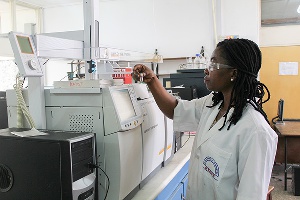A Ghanaian chemist whose research has shed light on the heavy metal content of tea, clay and dust in her home country is the first-ever winner of the Fayzah M. Al-Kharafi Prize, an annual award that recognizes exceptional women scientists from scientifically and technologically lagging countries.
The announcement that Marian Nkansah is its first winner was made today in Kigali, Rwanda, at the 27th General Meeting of The World Academy of Sciences (TWAS). The award recognizes her research for shedding light on the health risks raised by the human exposure to hazardous heavy metals in routine activities of daily life.
A major goal of Nkansah's research is to normalize heavy-metal testing and screening there.
“I would like to see intensified public education on the potential harm associated with the consumption of goods that are contaminated with heavy metals,” she said in an interview.
Marian Nkansah started her heavy metals research as a master’s student from 2003 to 2005 at the Kwame Nkrumah University of Science and Technology, taking groundwater samples from pumps used for drinking water. Some of the pipes were decades old and had never undergone maintenance, contaminating their water with lead.
That research would, in turn, shape her career. She joined the University’s faculty in 2007 and broadened her efforts into searching for toxic heavy metals that Ghanaians might encounter routinely.
The Prize is named for 2004 TWAS Fellow Fayzah M. Al-Kharafi from Kuwait, who provides the USD4,000 prize. Al-Kharafi, the former president of Kuwait University, was the first woman to head a major university in the Middle East. She is also a former TWAS vice president for the Arab Region.
Nkansah's research analyses substances that Ghanaians consume to determine both whether they contain metal elements with nutritional value as advertised, such as calcium and iron – and harmful metals such as arsenic, cadmium and lead. The effects of heavy metal poisoning can be serious and long-lasting, leading to cardiovascular diseases, cancer and convulsions in children among other illnesses that can be fatal.
One study by Nkansah and her colleagues focused on commercially available tea products on the Ghana. She found heavy metals that were possibly connected to plants cultivated for the tea, which could become contaminated through unclean water, smoggy air or polluted soil.
The plants also can become contaminated during the transport process, depending on what weather they are exposed to.
In a study published in the journal Environmental Monitoring and Assessment, she and her colleagues found that the arsenic levels in some of those teas, but not all, could pose a significant health risk.
She also screened clays for their metal content. In Kumasi, some people consume white clay from the country’s south-eastern Volta Region for reasons tied to their traditions. Sometimes, pregnant women eat the clay to combat morning sickness, to control diarrhoea or to simply feed a craving. Some also consume the clay for reasons tied to religious beliefs that the clay has general purifying effects.
So Nkansah put the clay to the chemistry test, looking for both nutritional elements and dangerous metals. In a study published in Toxicology Reports, she revealed that while the clay contained healthy elements such as calcium, iron, potassium and zinc, it also contained troubling levels of heavy metals – including arsenic and lead – that could pose a health risk.
“We found that they should refrain from consuming the clay,” she said in an interview. “We cannot guarantee the safety of pregnant women who consume that.”
Nkansah has also studied the content of dust in Ghanaian classrooms. Although Nkansah and her colleagues found metals such as cobalt, lead, chromium and mercury, their levels were too low to pose a risk to schoolchildren.
They want to expand their research to more parts of the country and continuously monitor schools, in case the metal content some day becomes dangerous. She also wants to see analyses extended to include cosmetics and personal-care products.
Studying tea and other products in search of heavy metals is not a new practice, but not very widespread in Ghana. She’s hoping that her research will influence local policymakers to support more research that engages directly with social well-being.
“I think generally scientists have been confined to their laboratories and there seems to be a disconnect between scientists and policymakers,” she added. “That is an area we have to work on, and hopefully help bridge the gap.”
General News of Wednesday, 16 November 2016
Source: twas.org













